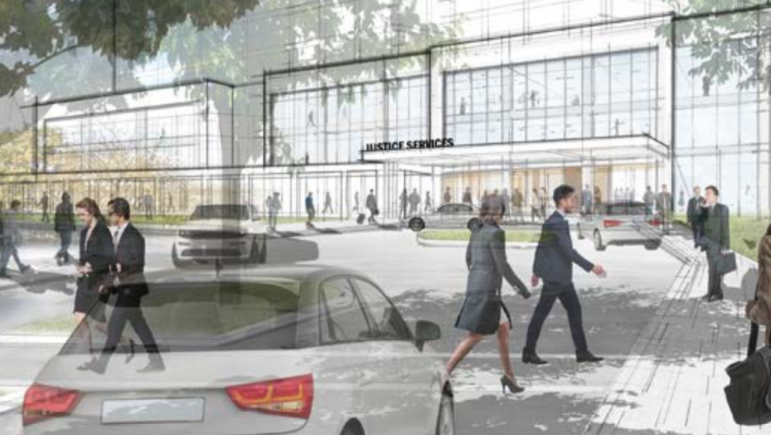
MOCJ
A city rendering of how the new jail in Queens might look.I bike past the Brooklyn Detention Complex twice a day, commuting from my apartment in Crown Heights to lower Manhattan and back. In November, I was relieved to hear that the de Blasio Administration plans to close the facility, along with one other, in 2020. I don’t like going past the towering jail; it feels incongruous with the surrounding shops and makes it difficult to ignore our bloated, brutal criminal justice system.
This feeling – that out of sight is out of mind – is exactly why Mayor de Blasio’s proposed borough-based jails are important.
The Mayor’s Office for Criminal Justice reports that New York City’s jail population has plummeted in recent years: 7,154 detainees this past October, compared to an average of 11,696 in 2013. The plan is to shrink the jail population to around 3,300 inmates by 2026 in time for Rikers Island to close. Yet De Blasio’s proposed borough-based facilities have been decried as skyscraper jails. Community boards in Chinatown, Boerum Hill, Mott Haven, and Kew Gardens have symbolically downvoted the jails slated for their areas. The community boards’ reasons were many: the buildings will dwarf their surroundings, take up space that could be put to better use, or make the controversies associated with Rikers Island feel too local.
I understand the community boards’ concerns. It is easy to ignore problems when they seem far away. It is easy to forget how big a number 3,300 – let alone 7,154 or 11,696 – actually is until you see the skyscrapers required to house that many people. It is easy to ignore our jails’ deplorable conditions until you hear inmates in sub-zero temperatures banging on the windows. It is easy for guard misconduct to feel remote when neglect and abuse happen on a small island off of Queens.
Compared to Rikers Island, De Blasio’s borough-based jails are an improvement. Detainees will be closer to courts and communities. The facilities will provide greater access to natural light and programming space for educational and recreational activities. New York City officials have even traveled to Norway to draw inspiration from Scandinavia’s world-leading detention facilities. But beyond the obvious improvements is one that lurks beneath the surface: skyscraper jails scattered throughout the city will make it harder for New Yorkers to turn a blind eye to our broken criminal justice system.
Activists oppose building new jails not because of neighborhood NIMBYism but because any expansion of jails, they believe, will perpetuate our reliance on incarceration. Prison abolition sounds radical, but ultimately, it is about envisioning a future where we take care of our neighbors rather than locking them up. These activists pushed De Blasio to commit $400 million to community-based programs, but the City Council’s October vote to close Rikers and open four additional jails shows that we still see detention as necessary. Whether we like it or not, these borough-based jails are happening. But when they bring criminal justice issues to people’s doorsteps, the coalition for radical reform may broaden. Individuals not currently concerned with our large jail population may start to care when they see what 3,300 really looks like.
So I say, build skyscraper jails in such prominent places that it’s impossible to look away. Make it as hard as possible for New Yorkers to forget what we do to thousands of our own in the name of safety. Shine a spotlight on the fallacy of the words “innocent until proven guilty.” Then, maybe then, we’ll start to see some radical change.
Benjamin Heller is a graduate student at NYU’s Robert F Wagner School of Public Service.









One thought on “Opinion: NYC’s Borough Jails Will Make Incarceration a Local Problem”
NYC administration is falling its law abiding citizens, jeopardizing their safety with placing jails in highly populated areas, bringing criminals closer to their victims. It’s not a crime to be poor, it’s a crime to steal, harass, assault, rob, murder. It’s simple – if smoking/selling marijuana is illegal, don’t do it, don’t have money for train, don’t jump turnstiles, walk. Yes, it’s not easy to obey the law, much easier to take from someone than to work for it. The current climate this administration has created rewards criminals. Steal someone’s phone and cash, assault them, get free education trough various programs. This city neglects it’s law abiding citizens who are left to deal with consequences of being robbed, assaulted or worse. Who is protecting them? Putting jails in residential areas is cruel to its victims, who have been punished enough.